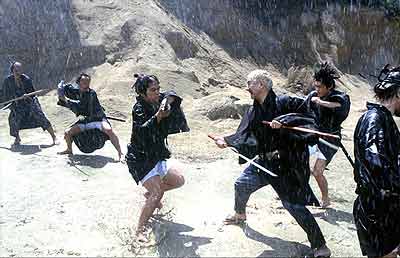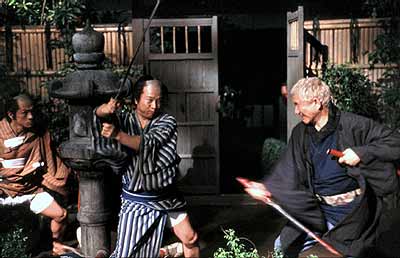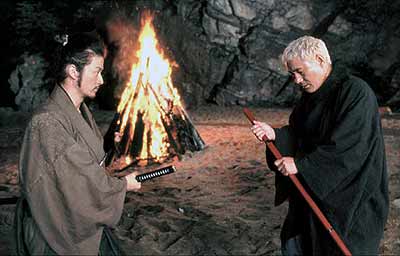Zatoichi
Kitano period piece that Kills Bill in the blink of a blind eye.

Takeshi Kitano; the Man, the Legend, and now the blind travelling masseur (or 'zato') who also happens to be a master swordsman. If such a premise sounds like the stuff of quasi-mythical classical Japanese literature then that's because it is. For us uninitiated Gaijin of the West, the character of Zatoichi sounds like nutty hokum (or at least a period version of Rutger Hauer's character in Blind Fury). To the Japanese, however, our man is the stuff of legend who has inspired countless books, movies and TV series. Kind of like Godzilla. Only more human. And with a sword. And he doesn't fight gigantic moths either...
Fans of Kitano's work will note that this is the director/actor/editor/superhuman's first megaphone-wielding foray into period pieces. Fears that the typical Takeshi humour or style might be bogged down by gowns and Geishas have thankfully been hacked to bloody death amidst a cacophony of familiar Kitano stylings and a few new flourishes of genius to boot, as our favourite Asian arse-kicker stays true to form without compromising the basis of the Zatoichi mythology. Kitano himself plays the lead in a simple Kurosawa-style tale of a seemingly humble travelling avenger who's a bit nifty with a sword. Sort of like a Samurai version of The Littlest Hobo, Zatoichi sees the blind masseur eeking out a living with his fingertips inbetween dishing out his own sharp form of justice to the gangs who would rob humble townsfolk.
One such gang are the Ginzo; a ruthless bunch of hoods with a penchant for murdering and burning down the homes of those who do not pay their daily tax. Upon arrival at the small village ruled over by these ne'er-do-goods, word begins to get around that the humble zato, whose name is Ichi, may indeed be the legendary 'Zatoichi' (fancy that), and the gang begin to take an interest, hiring wandering 'ronin' Hattori (Tadanobu Asano) to dispatch the lethal rib-tickler before he upsets their plans too much. At the same time, Zatoichi befriends a down and out gambler, Shinkichi (Guadalcanal Taka), and two vendetta-driven Geisha, Osei and Okinu (Daigoro Tachibana and Yuko Daike), who seek vengeance for the murder of their parents. You don't have to be a plot mathematician to work out how things progress from here, but then the proof of such puddings isn't in the story so much as it is in the character-driven action, and with a Kitano film you know you're in safe hands.

Indeed, despite the period setting and fairly relentless bloodletting, Zatoichi manages to be one of Kitano's warmest offerings to date, balancing every ounce of claret with a dose of humour that offsets the harsh limb-hacking with perfect judgment. Despite the detached nature of Kitano's Zatoichi (earlier incarnations are apparently much more caring in nature), the surrounding cast do a magnificent job of rounding out their often limited roles and bringing a much more human element back to the fore. Rather than feeling more restricted by the period setting, Kitano has seen fit to allow himself even more artistic licence than usual, the result being a heavier dose of his offbeat black humour than we're used to seeing, and as a result Zatoichi arguably represents his funniest movie since out-and-out comedy Getting Any?.
Yep, for every stroke that falls across the torso of his next victim, Kitano offers us semi-naked idiots running aimlessly around huts and rice farmers randomly dancing in their fields. Come the conclusion, Kitano also sees fit to poke fun at Zatoichi himself, playing with the notion of his blindness in a double-bluff that pulls the rug of a 'shock' revelation out from under the audience's feet at the very last moment. Not happy with sight gags alone, Kitano also subverts the traditional dance numbers of classical Japanese period dramas by inviting his favourite tap-dancing troupe and the entire cast to boogie along with hip-hop beats for the musical finale.
Of course, in any of Takeshi's film humour is secondary to strong character, and here the director and cast have done well to rise above the limitations of a fairly cliched 'wandering avenger' storyline. Tachibana and Daike as the vengeful Geisha add real heart to the movie, balancing revenge-driven mentality with moments of genuine tenderness and warmth. Likewise, Taka's turn as gambling addict Shinkichi steers just wide enough of traditional comedy-sidekick fare to feel different and refreshing. A-typically for a Kitano story however, there is even an element of humour to the actions of gang bosses Ginzo and Ogi (Ittoku Kishibe and Saburo Ishikura), clearly outlining the director's intentions for Zatoichi as a comedy as much as a Samurai revenge effort.

There are a number of limitations to Zatoichi, and in honesty it's hard to agree with all of the praise heaped upon it by a lot of the press. It's a great movie, yes, but not a sublime one. Chief concern is the accessibility to Western viewers of the central character himself. Now, don't get me wrong, it may well not have been at the front of Kitano's mind that a large percentage of his audience will not be familiar with Japanese folk characters, nor need it have been (if I want to learn more then it's my duty to do so, not Kitano's to spoon feed me). However I do wish a little more exposition had been delivered in regard to Zatoichi, especially given that Kitano himself has said much of the modern feel of the movie (Ichi's platinum bleached hair and "cool" sword) was intended to introduce the character to younger Japanese audiences who might not know so much themselves about the mythology. It's a small niggle and, as I say, as good an excuse as any to get off my arse and find out more, but not everybody will feel the same way.
Likewise the overly-simplistic story might service the action well but it makes it a bit harder to connect with some of the characters. Having said that, as I pointed out previously the cast do make excellent work of what they've been given, and that the movie does manage to be so warm despite the carnage is ample enough reward in itself. So, maybe undeserved of the Golden Lion of Venice, but certainly a fine entry into the Kitano canon nonetheless.
Zatoichi has done well to stay put until Kill Bill Vol. 1 and The Last Samurai have cleared the multiplexes, since it should capitalise nicely on the swords 'n' samurai vibe created by both, whilst pissing effortlessly over the former with consummate ease. Just like his character in the movie, you can always count on Kitano to deliver the goods, and whilst this might not quite be up there with Brother, Sonatine and Violent Cop it's still leagues ahead of pretty much everything else at your local fleapit.
Disko has seen fit to award this movie 4 out of 5 things.
Tadanobu Asano (Hattori)
Guadalcanal Taka (Shinkichi)
Daigoro Tachibana (Osei)
Yuko Daike (Okinu)
Ittoku Kishibe (Ginzo)
Saburo Ishikura (Ogi)